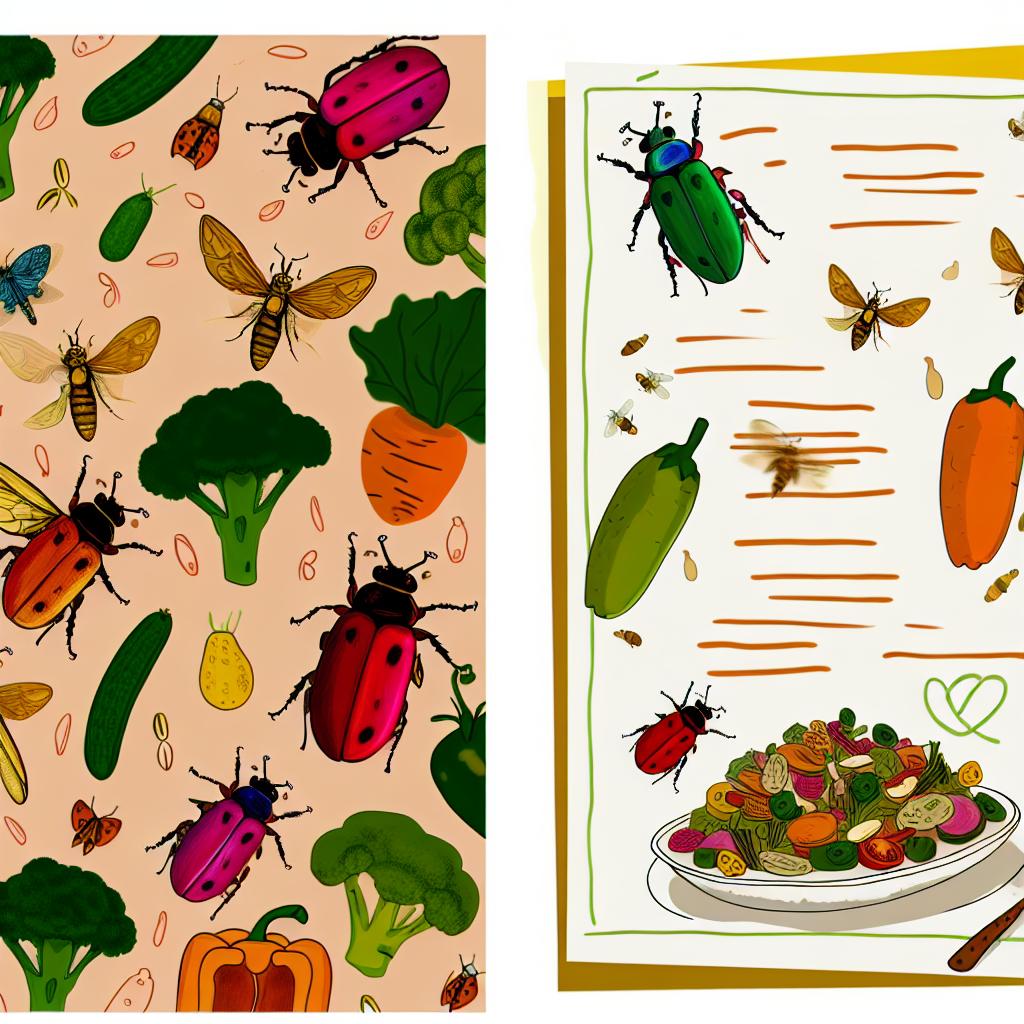Introduction: Insects in Plant-Based Diets
In recent years, the role of insects in human nutrition has gained significant attention. While traditional vegetarian and vegan diets exclude animal products, insects present a unique consideration. This article explores the role insects might play in these diets and their potential benefits. With populations growing and resources facing limits, alternative protein sources have entered the spotlight, and insects, often overlooked, are emerging as a contender.
Nutritional Benefits of Insects
Insects are rich in essential nutrients, offering a valuable protein source that can complement plant-based diets. They contain all nine essential amino acids and are high in vitamins such as B12, which is often deficient in vegan diets. Furthermore, they provide minerals like iron, zinc, and calcium. When considering nutrient density, insects often surpass many traditional plant sources.
While legumes and soy products offer plant-based protein, insect protein can be a more concentrated source, which may prove beneficial in regions where other sources are less accessible. The bioavailability of nutrients in insects is comparable or superior to that of traditional meats, making them an efficient dietary option.
In addition to protein, insects contain beneficial fats, notably polyunsaturated fatty acids, that are essential for health. Many insect species also provide dietary fiber, which aids digestion, although insects themselves are not a primary source of fiber. Additionally, insects have the potential to supply certain vitamins in more concentrated forms, like riboflavin, pantothenic acid, and biotin, which all play crucial roles in energy metabolism.
Beyond addressing personal dietary needs, the inclusion of insect protein can contribute to broader food security. This is particularly important in areas where agricultural conditions limit the cultivation of protein-rich crops. The potential for widespread adoption could greatly enhance nutrition profiles in undernourished regions.
Environmental Impact
Insects are heralded for their low environmental footprint. They require minimal land, water, and feed compared to conventional livestock. By integrating insects into vegetarian and vegan diets, it may be possible to reduce the overall environmental impact associated with food production, aligning with the ethical and environmental considerations of these diets.
From an environmental perspective, insect farming produces fewer greenhouse gases compared to traditional livestock agriculture. Methane emissions, predominantly from cattle, are a significant concern in climate change discussions, and insects offer a sustainable alternative with drastically reduced emissions. Likewise, the feed-to-protein conversion rate for insects is more efficient than that of most livestock, meaning less feed produces more protein.
Moreover, insects can be fed organic side-streams from agriculture and food waste, creating a closed-loop system that decreases food waste overall. This capacity to convert waste into edible protein aligns with sustainability goals.
In the context of a growing population and increased demand for food, integrating insects into our diets supports a sustainable approach to food security. Besides their nutritional value, their environmental benefits mark them as attractive options for promoting an eco-friendly food system.
Ethical Considerations
The inclusion of insects in vegetarian and vegan diets raises ethical questions. Many adherents to these diets argue against consuming any sentient beings. However, proponents suggest that if the primary motivation is to reduce harm relative to environmental damage and inefficient food systems, insects might be a viable option.
Insects tend to have less complex central nervous systems than traditional livestock, which may make their farming more ethically palatable for some. For those concerned primarily with minimizing animal suffering, insects might be viewed as ethically permissible. The ethical discourse around insects also includes a discussion about the natural role of insects in ecosystems, unlike traditional livestock that often strains ecosystems due to resource demands.
Each individual must weigh these considerations based on their dietary and ethical priorities. While there might be fewer concerns about the capacity of insects to experience pain and suffering, the ethical stance is deeply personal and varies widely among those with vegetarian and vegan beliefs.
Challenges and Considerations
Incorporating insects into vegetarian and vegan diets is not without challenges. A primary concern is the psychological barrier associated with consuming insects, prevalent in many Western cultures. Cultural perceptions often make entomophagy, or the practice of eating insects, unappealing. However, this resistance can be overcome gradually through education and the introduction of processed forms where insects are unrecognizable, such as protein powders or flours. Marketing efforts and culinary innovations could help shift perceptions by presenting insects as a gourmet food or nutritional powerhouse.
Moreover, regulatory standards and safety assessments need to address allergens and ensure safe insect consumption. Allergies to certain insects may mirror shellfish allergies due to shared proteins like tropomyosin. Robust frameworks are necessary to integrate insects into mainstream diets safely. As with any novel food source, rigorous testing and clear labeling are essential to both consumer protection and acceptance.
The development of clear guidelines on the farming, processing, and selling of edible insects will also aid in the mainstream acceptance of insect-based foods. Legal and regulatory pathways need to parallel those of traditional foods to ensure there’s no compromise in safety or quality.
Conclusion
Insects present an intriguing option for enhancing the nutritional profile of vegetarian and vegan diets, offering environmental and possibly ethical benefits. The acceptance of insects as a food source requires overcoming cultural biases and establishing rigorous food safety and ethical standards. To fully realize the benefits of entomophagy, further research is crucial. Studies on the long-term health impacts of insect consumption, food safety measures, and improved farming methods will provide the necessary insights to bolster public confidence.
Additionally, ongoing dialogue within the vegetarian and vegan communities will be essential in navigating the ethical landscape. These discussions can foster inclusive conversations about sustainability, ethics, and the future of food. Ultimately, the role insects will play in vegetarian and vegan diets will depend on successful integration into culinary practices and a shift in societal perceptions. For more detailed insights into the nutritional aspects of insects, visit the Proteinsect Project.

